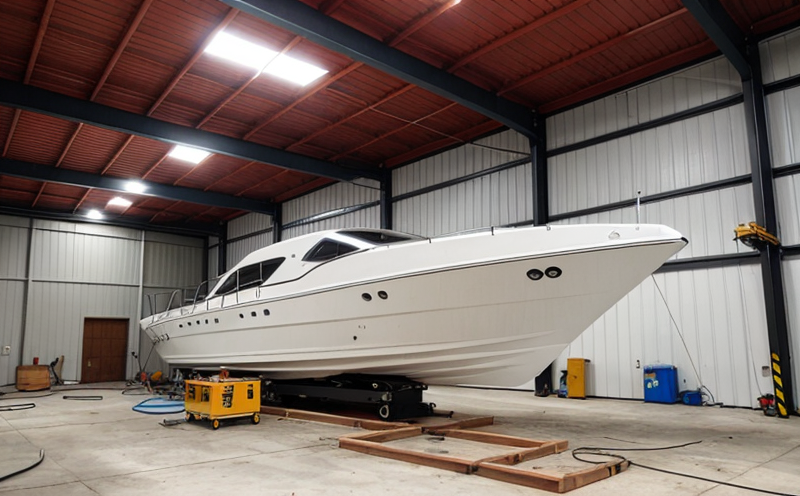ASTM D695 Compression Testing of Hull Polymers
The ASTM D695 compression testing method is a critical procedure in evaluating the mechanical properties of polymer materials used in marine and ship equipment, particularly focusing on hull polymers. This test assesses how these materials deform under compressive stress, providing essential data for ensuring structural integrity and durability.
In marine applications, where structures are subjected to harsh environmental conditions—such as saltwater corrosion, mechanical impacts, and temperature variations—the reliability of the materials used is paramount. ASTM D695 compression testing helps manufacturers and quality managers verify that the chosen polymer blends meet stringent performance requirements set forth by international standards.
The test involves subjecting a rectangular specimen cut from the material to uniaxial compression until it reaches 50% of its original height or fails. The resulting stress-strain curve provides insights into the modulus of elasticity, yield strength, and ultimate tensile strength. These properties are crucial for predicting how the hull polymer will behave under real-world loading conditions.
For R&D engineers and procurement specialists, understanding these mechanical behaviors is vital in optimizing material selection and ensuring compliance with regulations like ISO 18743-2 or ASTM D695 itself. This information aids in designing more robust and long-lasting hulls that can withstand the rigors of maritime operations.
Specimen preparation for this test requires precise cutting techniques to ensure uniformity across all samples. After fabrication, each sample undergoes conditioning according to specified temperature and humidity conditions before undergoing compression testing. This step ensures consistent results by eliminating any variability due to environmental factors.
The apparatus used includes hydraulic presses capable of generating controlled loads up to several thousand pounds-force (lbf) depending on the size of the specimen being tested. High-precision load cells measure the applied force accurately, while extensometers monitor displacement during compression. Data collected from these instruments is then analyzed using statistical methods to determine key mechanical properties.
The importance of ASTM D695 testing lies in its ability to provide quantitative data on polymer behavior under compressive stress conditions typical of marine environments. This information supports decision-making processes related to material specification, process optimization, and product development aimed at enhancing safety and performance standards aboard ships.
Why It Matters
The integrity of a ship's hull directly impacts its operational efficiency and safety. Any compromise in this critical component can lead to structural failures, leaks, or even catastrophic accidents. By subjecting hull polymers to ASTM D695 compression testing, stakeholders gain valuable insights into the material’s ability to withstand compressive loads without failing.
- Enhanced Safety: Ensures that materials used in ship construction can endure harsh conditions at sea.
- Better Durability: Identifies which polymers perform best over extended periods, reducing maintenance costs and downtime.
- Regulatory Compliance: Meets industry standards and regulations required for maritime operations globally.
Benefits
- Predictive Insights: Provides detailed stress-strain curves that forecast how materials will react under actual service conditions.
- Quality Assurance: Ensures all hull polymers meet specified mechanical property requirements set by international standards.
- Cost Efficiency: Helps avoid expensive failures and repairs by identifying weak points early in the design process.
Eurolab Advantages
At Eurolab, we pride ourselves on delivering comprehensive testing services tailored specifically for your unique needs. Our experienced team of engineers and technicians ensures accurate specimen preparation and precise data collection throughout every step of the ASTM D695 process.
- State-of-the-Art Facilities: Equipped with advanced hydraulic presses and high-precision instruments capable of generating reliable results consistently.
- Dedicated Expertise: Our specialists have extensive knowledge about polymer behavior under compressive stress, allowing them to offer expert advice on material selection and process optimization.
- Comprehensive Reporting: Deliver detailed reports that not only present test results but also interpret their significance in the context of your project goals.





